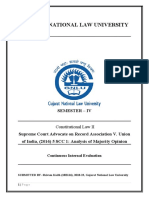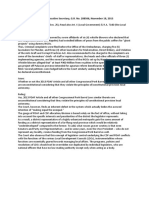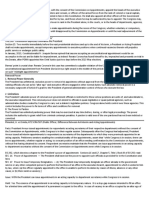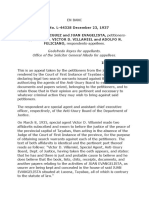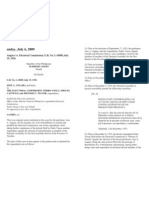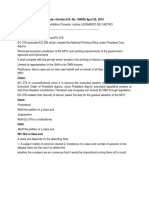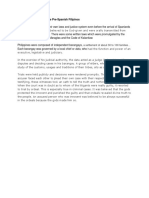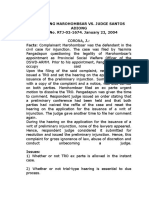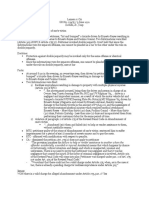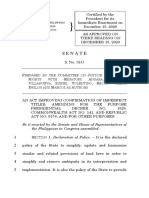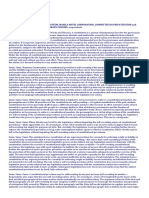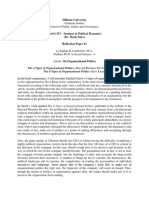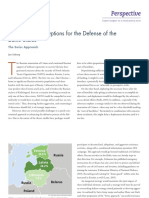0 ratings0% found this document useful (0 votes)
101 views8 Planas V Gil
8 Planas V Gil
Uploaded by
Saima Rodeu1) Planas, a Manila municipal board member, published statements criticizing government officials. She was ordered to appear before the Civil Service Commission (CSC) to prove the statements were made in good faith or face suspension.
2) Planas objected to the CSC's jurisdiction over the investigation. She argued the investigation violated the constitution and her statements were made in her private capacity.
3) The Supreme Court ruled that while the President's acts are generally not reviewable by courts, the courts can inquire into the validity of acts when challenged. It determined the CSC investigation of Planas was unconstitutional and issued a writ prohibiting the proceedings.
Copyright:
© All Rights Reserved
Available Formats
Download as DOCX, PDF, TXT or read online from Scribd
8 Planas V Gil
8 Planas V Gil
Uploaded by
Saima Rodeu0 ratings0% found this document useful (0 votes)
101 views3 pages1) Planas, a Manila municipal board member, published statements criticizing government officials. She was ordered to appear before the Civil Service Commission (CSC) to prove the statements were made in good faith or face suspension.
2) Planas objected to the CSC's jurisdiction over the investigation. She argued the investigation violated the constitution and her statements were made in her private capacity.
3) The Supreme Court ruled that while the President's acts are generally not reviewable by courts, the courts can inquire into the validity of acts when challenged. It determined the CSC investigation of Planas was unconstitutional and issued a writ prohibiting the proceedings.
Original Description:
PL
Original Title
8 Planas v Gil
Copyright
© © All Rights Reserved
Available Formats
DOCX, PDF, TXT or read online from Scribd
Share this document
Did you find this document useful?
Is this content inappropriate?
1) Planas, a Manila municipal board member, published statements criticizing government officials. She was ordered to appear before the Civil Service Commission (CSC) to prove the statements were made in good faith or face suspension.
2) Planas objected to the CSC's jurisdiction over the investigation. She argued the investigation violated the constitution and her statements were made in her private capacity.
3) The Supreme Court ruled that while the President's acts are generally not reviewable by courts, the courts can inquire into the validity of acts when challenged. It determined the CSC investigation of Planas was unconstitutional and issued a writ prohibiting the proceedings.
Copyright:
© All Rights Reserved
Available Formats
Download as DOCX, PDF, TXT or read online from Scribd
Download as docx, pdf, or txt
0 ratings0% found this document useful (0 votes)
101 views3 pages8 Planas V Gil
8 Planas V Gil
Uploaded by
Saima Rodeu1) Planas, a Manila municipal board member, published statements criticizing government officials. She was ordered to appear before the Civil Service Commission (CSC) to prove the statements were made in good faith or face suspension.
2) Planas objected to the CSC's jurisdiction over the investigation. She argued the investigation violated the constitution and her statements were made in her private capacity.
3) The Supreme Court ruled that while the President's acts are generally not reviewable by courts, the courts can inquire into the validity of acts when challenged. It determined the CSC investigation of Planas was unconstitutional and issued a writ prohibiting the proceedings.
Copyright:
© All Rights Reserved
Available Formats
Download as DOCX, PDF, TXT or read online from Scribd
Download as docx, pdf, or txt
You are on page 1of 3
8 PLANAS VS GIL jurisdiction.
At this stage of the investigation, Planas filed
GR NO. L-46440 before the SC a writ of prohibition but was denied.
JANUARY 18, 1939 Planas then requested the Comm. Gil to refrain from making
any ruling on the question of jurisdiction to investigate her
Topic: SOURCES; SEPARATION OF POWERS; ADMIN AGENCIES; ART IX; and to suspend the investigation until the jurisdictional issue
ADM CODE was ruled upon by the SC but was denied and Comm. Gil ruled
Petitioners: CARMEN PLANAS it had jurisdiction to proceed w/ the investigation. He directed
Respondents: CSC COMMISIONER JOSE GIL Planas to appear before him and to testify and present
Ponente: LAUREL, J. evidence. The OSG represented the CSC.
Planas contended:
FACTS: o CSC has no jurisdiction to investigate;
Planas, as a Manila municipal board member, publicized in a o Said investigation is against Art VII, Sec. 11 of the
newspaper a statement w/c criticized the acts of some gov’t (1935) Constitution and unwarranted in any statute;
officials in connection to the 1938 Assemblymen elections. She o Even if there is any statute, Planas as Councilor of
accused the ff.: Manila cannot be administratively investigated except
o That the President has violated the Constitution in that for acts/conduct in connection w/ the discharge of her
he has taken part in politics, expressing his preference official duties;
for the candidates of the Nacionalista Party; o As an elected officer, she is accountable to her
o That the whole government machinery has been put in constituency alone unless the act constituted a crime
action to prevent the election to the National Assembly and not to execute officials belonging to a party
of the candidates of the people; opposed to that w/c Planas belonged;
o That the candidates of the Nacionalista Party and of o Her statement was made in her private capacity and
the administration have won the election through had the right to freely discuss political questions w/c
frauds and violations of the civil service rules; and cannot be subject to any administrative investigation
o That the administration does not permit the people to and is only cognizable by regular courts in case the
freely elect the candidates of their choice. contents violate the RPC;
Following the publication, Planas received a letter signed by o If they are seditious, then the matter should be tried by
Pres. MLQ via Sec. Vargas directing Planas was appear before the regular courts;
the CSC to prove said statements and failure to prove that o The authority sought to be conferred by the CSC by the
they were made in good faith will be cause for her suspension letter written by Sec. Vargas is unenforceable since
or removal from office. presidential powers cannot be delegated; and
Planas heeded the order and presented her published Said investigation would be oppressive and arbitrary on CSC’s
statements in w/c she objected to the CSC’s authority to part w/c will impinged on her constitutional right as a citizen
conduct the investigation. to freely express her opinions.
The CSC still proceeded w/ the investigation but announced Planas prayed:
before adjournment that Comm. Gil would decide the CSC’s o Issue a writ of injunction to desist the investigation;
o Permanently prohibit the proceedings; premise does not mean that the courts cannot inquire to the
o Said orders be declared illegal acts’ validity when challenged in a proper proceeding. As far
o OSG claimed: as the courts are concerned, the SC is entrusted the obligation
o CSC has not only jurisdiction but has the duty to to determine in appropriate cases the validity of law hence the
investigate the charges; judiciary restrains other departments of gov’t as part of check
o The power to investigate is vested in the President by and balance of the government.
Sec. 11, Art VII of the 1935 Constitution and Sec. 64(c) In this case, the President is not party to the proceeding. He is
of the Admin Code; neither compelled nor restrained to act in a specific way. The
o The question WoN the good of public service requires CSC is the party by way of the President’s order that the court
the subject investigation is a matter of the President’s has no jurisdiction over the case; however, this is untenable.
opinion is conclusive hence cannot be reviewed by the A mere plea that a subordinate officer is acting upon the
courts; President’s orders but is not conclusive upon the SC. The
o The administrative investigation of any act by a gov’t President’s relative immunity from judicial interference is not
official is independent and exclusive of any judicial some permit for all subordinate officials of the Executive that
action that the parties may institute arising from the the mere invocation of such authority that it purports the SC’s
same act; jurisdiction to inquire into the validity of such orders is abated.
o Her theory that she is only accountable to her The issuance of prohibition is regulated by law and may be
constituents subject to a criminal action is untenable; issued to any person who committed GADALEJ. “Judicial” and
o Investigation is not arbitrary as it is provided in law; “ministerial” used in reference to “functions” include the
o No cause of action as she was uninjured; subject investigation done by the CSC and if unauthorized
o Action is premature hence the courts have no constitutes GADALEJ. Prohibition is not only to confined to
jurisdiction; and courts to keep them within their limited jurisdiction but also
o SC has no jurisdiction due to separation of powers to an officer acting GADALEJ. In this case, what is being
inquired is that the investigation is unconstitutional hence it is
Further, OSG raise the jurisdiction issue of the courts over the
necessary to inquire to the legal authority of the President to
President’s acts by contending that under the separation of
order such investigation.
powers, such acts cannot be reviewed by the courts as it is
purely administrative in nature.
Other related ruling:
Presidential Authority
ISSUE/S: Whether the courts have jurisdiction to review the acts of
The Constitution vests authority to the President as
the President - YES
introduced in Sec. 1, Art. VII “The Executive power shall be
vested in a President of the PH” and upon him sets forth his
HELD/RATIO:
duty to faithfully execute our laws, whether expressed or
implied, as in this case, may act through executive department
Judicial Review and Prohibition
heads as they are his assistants in the performance of his
Though it can be conceded that the President’s acts within his
powers and courts will not restrain such acts; however, this
duties. In other words, their acts are presumptively the due enforcement of rights, duties, obligations, prerogatives
President’s acts. and immunities growing out of the Constitution itself and of
Sec. 64(c) of the 1917 Admin Code provides the protection implied by the nature of the government under
In addition to his general supervisory authority, the the Constitution.
Governor-General (President) shall have such specific
powers and duties as are expressly conferred or imposed Right of Free Speech
on him by law and also, in particular, the powers and It is now a settled that the official conduct and the policies of
duties set forth in this chapter. Among such special public officials can be criticized and that criticism of the
powers and duties shall be: constitution and legislation, of government measures or
c) To order, when in his opinion the good of the public policies cannot be suppressed or prevented unless the
service so requires, an investigation of any action or the intention be to incite rebellion and civil war (Cooley,
conduct of any person in the Government service, and in Constitutional Limitations,
connection therewith to designate the official, committee, In the present case, however, Planas is not denied the right,
or person by whom such investigation shall be conducted. nor is she being investigated because she had exercised that
In this case, the letter informed Planas the charges she made right. She has a perfect right to criticize the Government, its
against the President and the effect it has is that it generates administration, its policies and officials, but she may not, on
discontent and hatred towards the gov’t and that public the plea of freedom of speech and of the press, impute
service requires that an investigation be conducted. Assuming violations of law and the commission of frauds and thereafter
that this is not one of the grounds provided by law for which decline to face an investigation conducted to elicit the veracity
the petitioner may be investigated administratively (sec. 2078, of the charges she imputed. Otherwise, it would degenerate
Rev. Adm. Code), there is weight in the argument that the into an unbridled license, and render the Government
investigation would still be in order if for no other purpose powerless to act.
than to cause a full and honest disclosure of all the facts so
that, if found proper and justified, appropriate action may be FALLO: The petition is hereby dismissed, with costs against the
taken against the parties alleged to have been guilty of the petitioner. So ordered.
illegal acts charged.
The enforcement of the law and the maintenance of peace
and order are primarily an executive obligation. The
declaration that the President should "take care that the laws
be faithfully executed" is more an imposition of an obligation
than a conferment of power. His oath requires him to
"faithfully and conscientiously fulfill" his duties as President,
"preserve and defend" the Constitution and "execute" the law.
This duty of the Executive to see that the laws be faithfully
executed is not limited to the enforcement of legislative acts
or the express terms of the Constitution but also includes the
You might also like
- Politics and Governance Chapter 3 SummaryDocument10 pagesPolitics and Governance Chapter 3 SummaryNaevisweloveu0% (1)
- 18B116 - Shivam Kaith - Supreme Court Advocate On Record Association V. UOIDocument13 pages18B116 - Shivam Kaith - Supreme Court Advocate On Record Association V. UOIShivam KaithNo ratings yet
- Anti-Bribery and Corruption Training - For Distribution PDFDocument30 pagesAnti-Bribery and Corruption Training - For Distribution PDFRuri Iswadi100% (1)
- Co y Quing V RepublicDocument5 pagesCo y Quing V RepublicKennethQueRaymundoNo ratings yet
- Legislative PowerDocument23 pagesLegislative Powerjoseph dave pregonerNo ratings yet
- 005 Lopez Vs Roxas 17 Scra 756 PrintedDocument6 pages005 Lopez Vs Roxas 17 Scra 756 Printedangelo6chingNo ratings yet
- CJ Admin Reviewer PDFDocument21 pagesCJ Admin Reviewer PDFSophiaFrancescaEspinosaNo ratings yet
- Case Digest - People vs. Gozo 53 SCRA 476, October 26, 1973Document1 pageCase Digest - People vs. Gozo 53 SCRA 476, October 26, 1973Lu CasNo ratings yet
- Belgica V Executive SecretaryDocument1 pageBelgica V Executive SecretaryJadeey NovalNo ratings yet
- Viudez II Vs CA (CrimPro Case17)Document2 pagesViudez II Vs CA (CrimPro Case17)Aya NamuzarNo ratings yet
- Statcon - Executive - Construction of Specific Type of LegislationDocument11 pagesStatcon - Executive - Construction of Specific Type of Legislationjake31No ratings yet
- VILLEGAS V SUBIDODocument2 pagesVILLEGAS V SUBIDOAngela Marie AlmalbisNo ratings yet
- Moga On SelfDocument9 pagesMoga On SelfPrincess SingNo ratings yet
- People v. HernandezDocument1 pagePeople v. HernandezGlim VaveeNo ratings yet
- Disomangcop v. Datumanong-444 SCRA 203 (2004)Document1 pageDisomangcop v. Datumanong-444 SCRA 203 (2004)Jeorge Ryan MangubatNo ratings yet
- Marcos V Manglapus G.R. No. 88211. September 15, 1989Document11 pagesMarcos V Manglapus G.R. No. 88211. September 15, 1989MWinbee VisitacionNo ratings yet
- Pichay Vs Dep SecDocument2 pagesPichay Vs Dep SecAnonymous 5MiN6I78I0No ratings yet
- Rufino v. Endriga, G.R. No. 139554, July 21, 2006 HI-LITEDocument15 pagesRufino v. Endriga, G.R. No. 139554, July 21, 2006 HI-LITEEmil BautistaNo ratings yet
- Ferdinand Marcos Raul Manglapus: Constitutional Law Ii Topic: Liberty of AbodeDocument1 pageFerdinand Marcos Raul Manglapus: Constitutional Law Ii Topic: Liberty of AbodeFayda CariagaNo ratings yet
- KMU Vs NEDA Director GeneralDocument2 pagesKMU Vs NEDA Director GeneralmyschNo ratings yet
- Bowsher v. Synar, 478 U.S. 714 (1986)Document61 pagesBowsher v. Synar, 478 U.S. 714 (1986)Scribd Government DocsNo ratings yet
- Case Digest US V Ling Su FanDocument4 pagesCase Digest US V Ling Su FanLynrose TabuzoNo ratings yet
- Kinds of Admin Law: Public OfficeDocument4 pagesKinds of Admin Law: Public OfficeRock StoneNo ratings yet
- Philippine Virginia Tabaco Adm vs. CIR (G.R. No.l-32052, July 25, 1975)Document2 pagesPhilippine Virginia Tabaco Adm vs. CIR (G.R. No.l-32052, July 25, 1975)PAOLO ABUYONo ratings yet
- Power of AppointmentDocument28 pagesPower of AppointmentRyanMacadangdangNo ratings yet
- Belgica vs. Executive SecretaryDocument37 pagesBelgica vs. Executive SecretaryJoyelle Kristen TamayoNo ratings yet
- Republic v. Sandiganbayan, 407 SCRA 10 (2003) PDFDocument162 pagesRepublic v. Sandiganbayan, 407 SCRA 10 (2003) PDFAcademics DatabaseNo ratings yet
- Barcelon vs. BakerDocument2 pagesBarcelon vs. Bakerharuhime08No ratings yet
- ConCom, Impeachment, OmbudsmanDocument3 pagesConCom, Impeachment, Ombudsmanprinsesa0810No ratings yet
- MACAGA-AN vs. PEOPLEDocument1 pageMACAGA-AN vs. PEOPLEZyrene CabaldoNo ratings yet
- 175 Scra 343Document2 pages175 Scra 343Rose Diesta-SolivioNo ratings yet
- Elec Chap 1Document2 pagesElec Chap 1dhadhagladysNo ratings yet
- Animas vs. PVAODocument19 pagesAnimas vs. PVAOConradoJimenezNo ratings yet
- Salonga Vs Paño, GR No. L-59524Document13 pagesSalonga Vs Paño, GR No. L-59524Ashley Kate PatalinjugNo ratings yet
- Legaspi v. Minister of FinanceDocument2 pagesLegaspi v. Minister of FinanceGia DimayugaNo ratings yet
- Rodriguez vs. VillamielDocument7 pagesRodriguez vs. VillamielAlfred DanezNo ratings yet
- Admin MidtermsDocument262 pagesAdmin MidtermsKay Ann J GempisNo ratings yet
- Consti2 Case Digests - Searches & SeizuresDocument12 pagesConsti2 Case Digests - Searches & SeizuresStella BertilloNo ratings yet
- The Executive DepartmentDocument3 pagesThe Executive DepartmentVivian NiñonNo ratings yet
- Banda V Ermita PDFDocument3 pagesBanda V Ermita PDFKaren Faith AbreaNo ratings yet
- Palana Vs PeopleDocument12 pagesPalana Vs PeopleDili Si ShanNo ratings yet
- Tan Vs People, G.R. No. 173637. April 21, 2009Document2 pagesTan Vs People, G.R. No. 173637. April 21, 2009ashyyNo ratings yet
- Manila Prince Hotel v. GSIS G.R No. 122156Document2 pagesManila Prince Hotel v. GSIS G.R No. 122156Johnking CastorNo ratings yet
- Consti - Mmda vs. BelairDocument2 pagesConsti - Mmda vs. BelairIrish GarciaNo ratings yet
- The Judicial System (Pre-Spanish)Document1 pageThe Judicial System (Pre-Spanish)Jude LeinNo ratings yet
- 7 Marohombsar Vs Adiong, G.R. No. RTJ-02-1674. January 22, 2004Document2 pages7 Marohombsar Vs Adiong, G.R. No. RTJ-02-1674. January 22, 2004Perry YapNo ratings yet
- Department of Agriculture Vs NLRCDocument4 pagesDepartment of Agriculture Vs NLRCRomielyn MacalinaoNo ratings yet
- Sec. 32 Subic Bay Metropolitan Authority v. COMELEC - DigestDocument2 pagesSec. 32 Subic Bay Metropolitan Authority v. COMELEC - DigestLorenzo Elegio IIINo ratings yet
- PP Vs Marcos Daw (117 SCRA 999)Document7 pagesPP Vs Marcos Daw (117 SCRA 999)Ten LaplanaNo ratings yet
- Article XI DoctrinesDocument15 pagesArticle XI DoctrinesJbo CelNo ratings yet
- Comendador Et Al vs. de Villa Et AlDocument9 pagesComendador Et Al vs. de Villa Et AlD MonioNo ratings yet
- Carpio vs. Executive SecretaryDocument3 pagesCarpio vs. Executive SecretaryKristine JoyNo ratings yet
- LegRes - Orceo V.comelec, G.R.no.190779, March26,2010Document2 pagesLegRes - Orceo V.comelec, G.R.no.190779, March26,2010abdullhNo ratings yet
- Home Guaranty Builders Vs R-II BuildersDocument4 pagesHome Guaranty Builders Vs R-II BuildersMarc VirtucioNo ratings yet
- Tejano v. Ombudsman G.R. No. 159190. June 30, 2005 FactsDocument6 pagesTejano v. Ombudsman G.R. No. 159190. June 30, 2005 FactsatiffaneeNo ratings yet
- Ignacia v. FFIBDocument1 pageIgnacia v. FFIBLloyd David P. VicedoNo ratings yet
- Republic V HidalgoDocument6 pagesRepublic V HidalgoMarian's PreloveNo ratings yet
- Cases For PrelimDocument49 pagesCases For PrelimDILG XIII- Atty. Robelen CallantaNo ratings yet
- Ready For Printing DigestDocument106 pagesReady For Printing DigestMemings EvilshitNo ratings yet
- STAT Syllabus DefinitionDocument5 pagesSTAT Syllabus DefinitionGJ LaderaNo ratings yet
- Carmen Planas vs Jose Gil - Uber DigestsDocument2 pagesCarmen Planas vs Jose Gil - Uber DigestsValerie PascualNo ratings yet
- Planas Vs GilDocument2 pagesPlanas Vs GilLouie RaotraotNo ratings yet
- Offender Accidentally Wounded or Injured. Accidental Means That Which Happens by ChanceDocument3 pagesOffender Accidentally Wounded or Injured. Accidental Means That Which Happens by ChanceSaima RodeuNo ratings yet
- Dam, Land Law and Economic DevelopmentDocument36 pagesDam, Land Law and Economic DevelopmentSaima RodeuNo ratings yet
- 01 People v. Puno - DIGESTDocument2 pages01 People v. Puno - DIGESTSaima RodeuNo ratings yet
- Senate Bill 1931 S. 2020Document12 pagesSenate Bill 1931 S. 2020Saima RodeuNo ratings yet
- 2 Anlud Metal Recycling Corp V AngDocument5 pages2 Anlud Metal Recycling Corp V AngSaima RodeuNo ratings yet
- Chapter 1 SyllabusDocument4 pagesChapter 1 SyllabusSaima RodeuNo ratings yet
- Corp Week 4Document6 pagesCorp Week 4Saima RodeuNo ratings yet
- 11.) Citibank v. SabenianoDocument3 pages11.) Citibank v. SabenianoSaima RodeuNo ratings yet
- Occena V COMELECDocument2 pagesOccena V COMELECSaima RodeuNo ratings yet
- 02 Estepa V Sandiganbayan - DIGESTDocument3 pages02 Estepa V Sandiganbayan - DIGESTSaima RodeuNo ratings yet
- Chanroblesvirtuallawlibrary: Olongapo City Jail (Is) Denied For Utter Lack of MeritDocument7 pagesChanroblesvirtuallawlibrary: Olongapo City Jail (Is) Denied For Utter Lack of MeritSaima RodeuNo ratings yet
- A.M No P-05-1938 - Nov 7 2017: Oca V EgipitoDocument9 pagesA.M No P-05-1938 - Nov 7 2017: Oca V EgipitoSaima RodeuNo ratings yet
- 24 San Miguel vs. Heirs of Sabiniano InguitoDocument2 pages24 San Miguel vs. Heirs of Sabiniano InguitoSaima Rodeu100% (1)
- 32 Barangay Association For National20180926-5466-1fd49wrDocument10 pages32 Barangay Association For National20180926-5466-1fd49wrSaima RodeuNo ratings yet
- 20 DBP v. NLRC (1990) - El DebbarDocument2 pages20 DBP v. NLRC (1990) - El DebbarSaima RodeuNo ratings yet
- Velarde V SJS (Group6)Document2 pagesVelarde V SJS (Group6)Saima RodeuNo ratings yet
- Insurance Code 97Document5 pagesInsurance Code 97Saima RodeuNo ratings yet
- UMIL Vs RAMOSDocument5 pagesUMIL Vs RAMOSSaima RodeuNo ratings yet
- Lambino v. Comelec G.R. No. 174153 Oct. 25 2006 Carpio, J: FactsDocument3 pagesLambino v. Comelec G.R. No. 174153 Oct. 25 2006 Carpio, J: FactsSaima RodeuNo ratings yet
- 1 Cayetano - v. - Commission - On - Elections PDFDocument6 pages1 Cayetano - v. - Commission - On - Elections PDFSaima RodeuNo ratings yet
- Petitioners Vs Vs Respondent: First DivisionDocument53 pagesPetitioners Vs Vs Respondent: First DivisionSaima RodeuNo ratings yet
- 2023-2024 Project Description APIF Updated Sept 26 (Human Rights & Gender Group)Document8 pages2023-2024 Project Description APIF Updated Sept 26 (Human Rights & Gender Group)rizki ardiwinataNo ratings yet
- Quality Is Everything - Not Profit! Profit Should Only Be The By-Product of Quality ServiceDocument27 pagesQuality Is Everything - Not Profit! Profit Should Only Be The By-Product of Quality ServicetrishaNo ratings yet
- Viksit Bharat 2047 - GuidelinesDocument20 pagesViksit Bharat 2047 - GuidelinesBalu samyNo ratings yet
- Dear Colleague Letter 2006Document5 pagesDear Colleague Letter 2006Sebastian ArroyoNo ratings yet
- PDF LTR For FIRDocument2 pagesPDF LTR For FIRSiddhi somaniNo ratings yet
- Case Study 8Document1 pageCase Study 8Jaycel Babe VerancesNo ratings yet
- Multi PageDocument136 pagesMulti PageAbdulhafiz AbakemalNo ratings yet
- Module 02 - Corporate GovernanceDocument11 pagesModule 02 - Corporate GovernanceLee TeukNo ratings yet
- Tor Itmp TobaDocument34 pagesTor Itmp TobanisarchmnnNo ratings yet
- Lesson 2 DoneDocument10 pagesLesson 2 DoneRochelle Cunanan LaurzanoNo ratings yet
- BCG Mastering Transformation in The Public Sector June 2018 - tcm23 194483Document21 pagesBCG Mastering Transformation in The Public Sector June 2018 - tcm23 194483ITUMELENG POHOTONANo ratings yet
- Management Response To IAIG 2009 Activity ReportDocument7 pagesManagement Response To IAIG 2009 Activity ReportDaniela KabiljoNo ratings yet
- Journal Review ON Public Goods: Name: Jomoc, Princess Joeliza ADocument6 pagesJournal Review ON Public Goods: Name: Jomoc, Princess Joeliza ADominic BarrientosNo ratings yet
- PublicDocument3 pagesPublicJabir MussaNo ratings yet
- Neo ConservativesDocument25 pagesNeo ConservativesHugo BeltranNo ratings yet
- Impact of Taxes On Economic Development BackgroundDocument5 pagesImpact of Taxes On Economic Development BackgroundAbdullahiNo ratings yet
- Social Construction of Target Populations - Implications For Politics and Policy - Anne Schneider and Helen IngramDocument15 pagesSocial Construction of Target Populations - Implications For Politics and Policy - Anne Schneider and Helen IngramBenSandoval_86No ratings yet
- Manila Prince Hotel vs. GSISDocument11 pagesManila Prince Hotel vs. GSISFrancise Mae Montilla MordenoNo ratings yet
- Legal Studies (Law 66004) Introduction To Law (Law 63704) : Malaysian Legal System (Part 2)Document2 pagesLegal Studies (Law 66004) Introduction To Law (Law 63704) : Malaysian Legal System (Part 2)wjNo ratings yet
- Andean Community AND African Economic CommunityDocument17 pagesAndean Community AND African Economic CommunityAnwar KhanNo ratings yet
- Question No 2. What Are The Ideological Factors Help To Explain TheDocument3 pagesQuestion No 2. What Are The Ideological Factors Help To Explain TheShahriar SayeedNo ratings yet
- Nduju 6 VK 2 Fyr 7 D 8 Doyu 3Document201 pagesNduju 6 VK 2 Fyr 7 D 8 Doyu 3Talis TemNo ratings yet
- Activity 3: The Concept Map of Globalization The Contemporary WorldDocument2 pagesActivity 3: The Concept Map of Globalization The Contemporary WorldClerk Janly R Facunla100% (1)
- Lamboloto - Reflection Papers - Political DynamicsDocument12 pagesLamboloto - Reflection Papers - Political DynamicsljblambolotoNo ratings yet
- Building Performance Standards - Jan 2023 PDFDocument106 pagesBuilding Performance Standards - Jan 2023 PDFJohn ZapantaNo ratings yet
- Rand Pe179 PDFDocument12 pagesRand Pe179 PDFajmc1No ratings yet
- Lesson 1: Introduction To Good GovernanceDocument7 pagesLesson 1: Introduction To Good GovernanceKath Dayag100% (1)
- The Accidental Caseworker - How Digital Self-Service Influences Citizens' Administrative BurdenDocument11 pagesThe Accidental Caseworker - How Digital Self-Service Influences Citizens' Administrative BurdenIgorFilkoNo ratings yet

